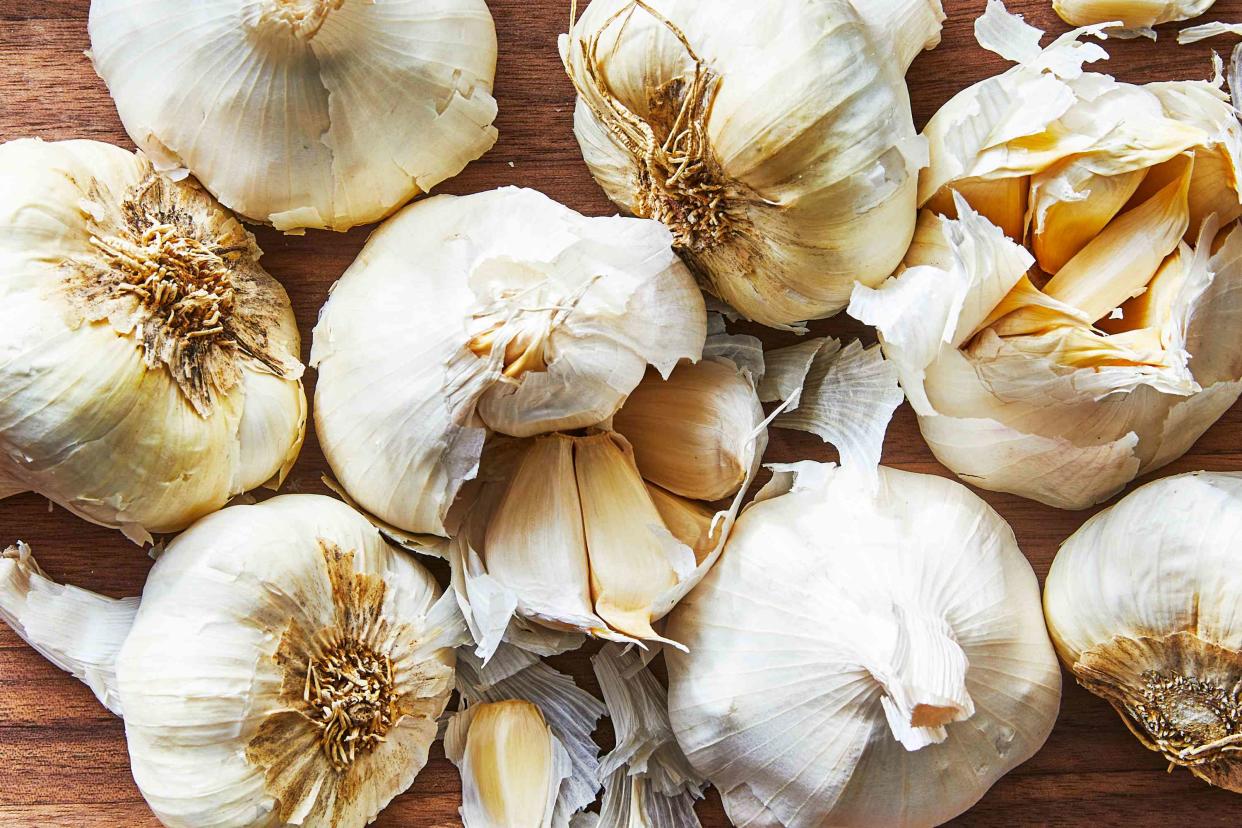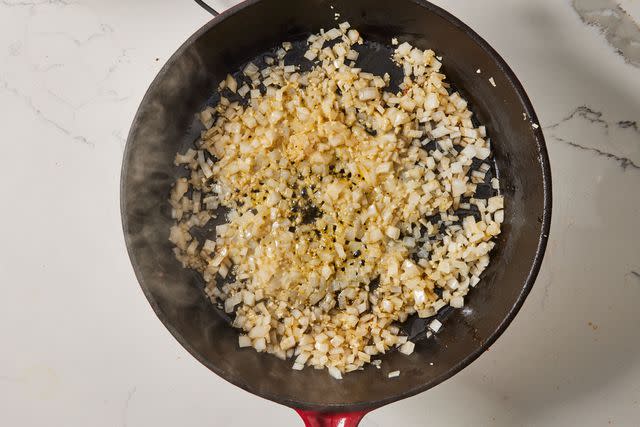Can You Freeze Garlic?
Will garlic bulbs turn to mush if you put them in a freezer? We asked the experts.

Caitlin Bensel; Food Styling: Torie Cox
Fresh garlic counts among the most reliable workhorse ingredients available to chefs and home cooks, both because of its vibrant allium flavor and because it’s so affordable and easy to store.
"Garlic is versatile and hearty," says Trevor Craig, a scientist and food safety expert at Microbac Laboratories.
That’s why garlic's long shelf life is such a benefit; when stored in a “cool, dry place,” Michael Handal, chef/instructor at the Institute of Culinary Education, tells us that whole heads of garlic can remain fresh “for up to six months.”
But if your kitchen is short on cool and dry areas, or if you find yourself with more garlic than you can realistically use in the near future, the freezer presents an easy storage option that will keep your garlic ready to use for months to come.
Read on to learn more about the best ways to freeze fresh garlic, along with tips on how to freeze roasted garlic and pre-minced and jarred garlic, too.
Can You Freeze Fresh Garlic?
In terms of food safety, the experts we spoke with all agree that freezing fresh garlic cloves doesn’t present much of a risk. However, there can be some freeze-related consequences where flavor and texture are concerned.
“Freezing causes the sulfur compounds, which give garlic its punchy flavor, to mellow. It's not significant, but it's something to be aware of," explains David Leite, food writer and author of The Portuguese Table.
Texturally speaking, freezing tends to "make [garlic cloves] much softer" after defrosting, says Atlanta-based chef, cookbook author, and TV personality Jennifer Booker. This texture variance is particularly notable when serving the garlic raw (like in a pico de gallo), so Booker tells us that she prefers to use defrosted garlic "in soups, sauces, and stews."
How To Freeze Fresh Garlic
While it’s possible to freeze whole heads of garlic, chefs generally prefer to freeze cloves after they’ve been peeled.
According to Kelsey Bernard Clark, Top Chef alum and chef/owner of KBC Eatery in Dothan, Alabama, you’ll want to start by "thoroughly rinsing your garlic" because "garlic is a big holder of mold." Next, "space [the cloves] out on a sheet tray to freeze, separately from one another. Once frozen, place the frozen cloves in a plastic bag or a plastic container."
Another option is to try a "popular way that Koreans freeze garlic," in the words of Suhan Lee, chef and co-founder of Get Saucy. Lee describes this process as "mincing the cloves in a food processor and then freezing them in flat ziplock bags. You can then use chopsticks or the back of a knife to press into the bags to separate them into easily used "squares" that can be used one or several at a time [by throwing them] directly into a stew or into a hot sauté pan."
For best results, Sarah Seghi, executive chef of Eberly in Austin, Texas, recommends using your frozen garlic within one month of freezing.
Defrosting the garlic is, as Lee says, “as simple as leaving the garlic out at room temperature for about 20 minutes and then using it as you would normally."
How To Freeze Roasted Garlic
Some of the chefs we spoke with expressed hesitation about freezing fresh garlic cloves, with Chef Brett Riley of The Harlow in Charleston, South Carolina telling us that “I wouldn't freeze raw garlic because it has all those water molecules, and when you thaw it out, those are now going to be watery, translucent, and mushy. But confited garlic is packed in oil and then roasted. That oil content will still be in there, and then when you can freeze it, the water content won’t affect the flavor because it has been cooked out."
To create a garlic confit, “roast the cloves [in oil], cool them, and pass them through a sieve to make a puree. You can also reserve and freeze the aromatic oil for later use. Then, I would freeze the puree in silicon molds or small jars. That way, it can be defrosted and used one portion at a time,” says Julia Sullivan, chef and co-owner of Henrietta Red in Nashville.

Jen Causey; Food Stylist: Margaret Dickey; Prop Stylist: Hannah Greenwood
Can You Freeze Jarred Garlic?
If you’re a fan of pre-minced jarred garlic, you’ll be glad to know that “jarred minced garlic can safely be frozen,” says Meggan Hill, chef and CEO of Culinary Hill. However, Hill also says that "this garlic product has been pasteurized [heat-treated to stabilize and kill bacteria] and is packed in water and citric acid,” all of which can "reduce its raw, fresh taste."
Collin Saum, the Principal Culinary Program Manager at Whole Foods Market, takes this a step farther by strongly advising against “freezing cooked, pre-minced, or jarred garlic. Once you cut garlic, you are breaking its cells and releasing enzymes that react with oxygen, which complicates the freezing process and changes the flavor of the garlic."
But if you’re determined to go ahead with freezing jarred garlic, Hill recommends only using defrosted minced garlic in slow-cooked dishes, and her freezing process is as follows: “Ensure there is one inch of headspace in the jar for expansion, then date and freeze [the jar] for up to three months.”
As an alternative, you can “portion the jarred garlic into teaspoons, tablespoons, or ice cube trays. Freeze individually, then transfer the rounds or cubes to a freezer-safe container. Thaw overnight in the refrigerator or add straight to recipes while frozen," she says.
For more Southern Living news, make sure to sign up for our newsletter!
Read the original article on Southern Living.
